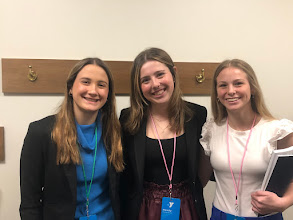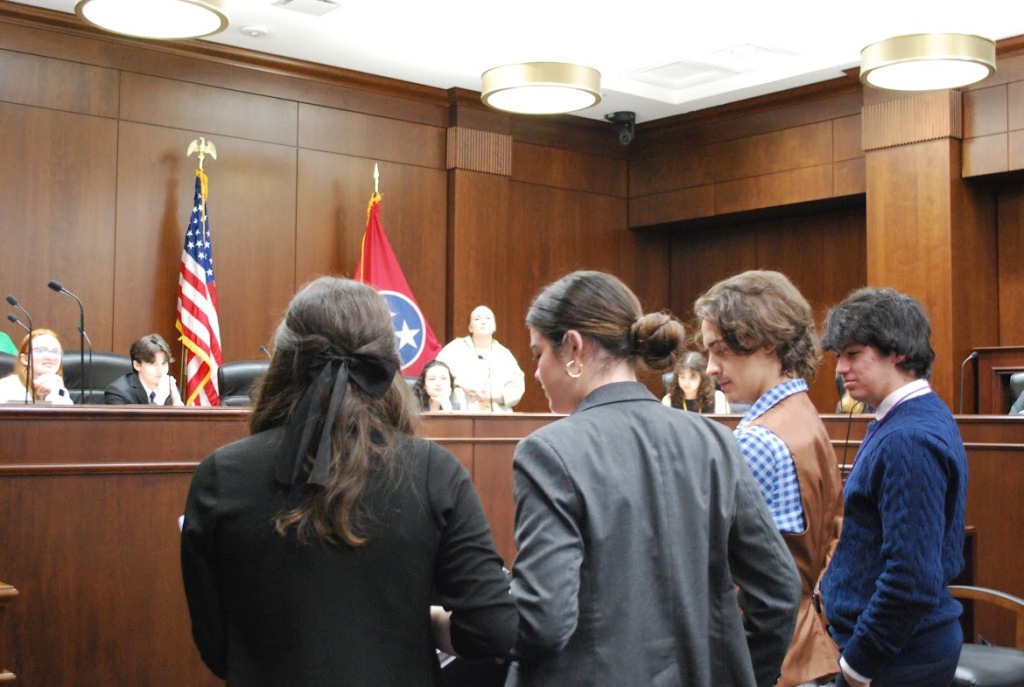Written by Jaclyn Owens, Adriana Guevart, and Savannah Greenshaw
Brooke Wilson
Brooke Wilson is a junior at Sale Creek High School and running to be the YIG 2025 governor! Her platform points are:
- More funding for public schools;
- More access to healthcare in rural facilities;
- And focus on the opioid crisis in Tennessee.
Brooke explains her first point about more funding for public schools by saying, “Currently Tennessee is in a really bad bracket for spending. I go to a very small public school, and it hurts to know that my education is being hindered by the fact that we are not putting enough money into our educational systems. I have seen the impact that it has on my school and I want to do everything that I can to make it to where students in Tennessee can have a better future because of the access to academic resources we can provide.”
Her point about more access to healthcare in rural facilities is very important to her as it hits close to home. She stated that “93% of Tennessee is rural and I am from a rural area myself.” Brooke continued, “Tennessee is ranked second right now for the most rural hospital closures since 2005 and that is just a sad fact to look at. To me, it is just really sad and disheartening to know that our citizens don’t have access to healthcare because of where they live. I think it’s really important to make sure that the health of our citizens is prioritized especially after the recent pandemic. It’s important to know that they can reach out to people and use facilities that our state has to offer.”
Brooke’s third point about the opioid crisis in Tennessee is a very pressing issue she’s worried about as she says, “Right now Tennessee is ranked second for prescription drug abuse in the country and opioid deaths. In 2022, we lost almost 4,000 people due to opioid overdoses and that is just a real sad fact to look at.” Furthermore, Brooke said, “The Tennessee government defines this as epidemic level deaths and I think as a state that is something we just really need to work on especially just to better our state’s health.” Brooke shows how personal it is by saying, “important to me mainly because knowing that a lot of these cases are kids my age makes me want to make sure the youth of Tennessee is protected as well as the can be.”
Uma Sood
Uma Sood is a junior at Central Magnet High School and is running to be the YIG 2025 governor! Her platform includes:
- Sustainable infrastructure;
- Supplying teachers with the resources needed to help disadvantaged students;
- And addressing the nursing and healthcare crisis.
In her first point, Uma discusses the necessity to “reduce the carbon footprint” with sustainable infrastructure. With the rate at which Tennessee is currently growing, it is crucial to keep a focus on green infrastructure for a better, cleaner state. In addition, she emphasized the need for infrastructure in our schools. She added that “Tennessee schools alone need 5.8 billion dollars worth of infrastructure to keep up with the national average.” With a number like that, it’s no surprise that Uma would want to focus on infrastructure in her platform.
In her second platform, Uma focused on supplying teachers with the resources they need to help each student without needing to use their own money. Currently, teachers use their hard-earned money to pay for resources for their students. Uma hopes to change that by “providing teachers with better resources so they can focus on their students without expending their personal resources.” If teachers don’t have to spend time trying to find ways to supply their students with the resources needed, then they can put their energy into solely educating their students.
Finally, Uma hopes to address the nursing shortage and healthcare crisis in Tennessee. She explained that “approximately 92.6% of Tennessee counties don’t have access to health care professionals”. This is a shocking number, to say the least. Professional healthcare is a necessity for every person in Tennessee and Uma hopes to fix this issue as governor.
Simon Lewis
Simon Lewis is a junior at Signal Mountain High School and is running to be the YIG 2025 governor! His three main platform points are:
- Food insecurity;
- Improving voter turnout;
- And focus on quality education.
Simon explains in his first point that he would make sure that “Tennesseans remain well fed.” Currently, in Tennessee, 1 in 9 people face hunger, and 1 in 8 children face hunger. Simon emphasizes that food inflation has increased drastically in recent years. The price of eggs has increased 250% in the last four years. He plans to address this issue by providing all Tennessee students with free breakfast and lunch. He also plans to permanently end the state sales tax on essential food items, and partner with local food banks and non-profit organizations to ensure the hungry are being fed.
Simon’s second point is enabling more Tennesseans to vote by increasing voter access. He says Tennessee ranked number 44th in the nation for voter turnout in the 2020 election. He says there are two main approaches to solving this issue. The first is spreading awareness about voting, and its importance to the United States’ democratic process. If citizens understand why their vote is significant, they will be more inclined to vote. The second approach is reforming Tennessee’s voter laws and access to the polls. This includes providing same-day voter registration, allowing no-excuse absentee/mail-in voting, and restoring ex-felons rights to vote. He believes by taking these measures, he can drastically improve voter turnout in Tennessee.
Simon’s final point is improving public education in Tennessee. He says some current issues with our education system are teachers being underpaid, schools being underfunded, books being banned in libraries, and students being defined by a single test score. Tennessee has one of the lowest rankings in the nation in every aspect of our public education system, and Simon has a plan to improve this. He plans to make a difference by repealing Tennessee’s third-grade retention law, which states that a third-grade student determined not to be proficient in English language arts may not advance to fourth grade. Simon stresses that this law puts too much emphasis on test scores, and some students may have other strengths. It is unfair to hold back students based on one test grade. He urges to stop unnecessary censorship in school libraries. He also plans on putting money back into public education, rather than spending it on school vouchers and overall increasing funding for school facilities and employees in Tennessee.
Sophie Bugg
Sophie Bugg is a junior at Green Hill High School and is running to be the 2025 YIG Governor! Her platform is:
- Youth sports involvement;
- Supporting and serving local homeless encampments;
- And providing severe weather and disaster relief for those in need.
In her first platform, she addresses youth sports involvement. Like many of us, Sophie has been involved in sports since she was a kid. She explained that she “genuinely believes it helps develop both teamwork and individual life skills”. This is why it’s astonishing that there are so many children in Tennessee who want to play sports but can’t because of financial issues. Sophie hopes to address this by emphasizing volunteer programs like the YMCA so that every child can have the opportunity to play the sport they love.
Sophie also wants to support local homeless shelter encampments. “Currently,” she said, “Tennessee has the 6th largest homeless population in the country, yet encampments get shut down every day.” This is especially concerning during the wintertime because, without the proper shelter and supplies, our homeless population is left defenseless against the winter storms. Sophie hopes to provide these encampments with the necessary resources to support the homeless population and keep the encampments open.
Finally, Tennessee is a frequent sufferer of severe weather. She plans to address this issue by providing disaster relief to those who require aid and recovery. Just this past year in 2023 40 tornadoes struck Tennessee. This left Tennessee destroyed with miles of damage. Sophie is especially concerned for those who are disabled, elderly, or unable to recover without aid. Her solution to the issue is to provide more aid to those who need it and to encourage others to help a neighbor in need.
Avery Gill
Avery Gill is a junior at Lebanon High School and is running to be the 2025 YIG Governor! Her platform is:
- Supporting survivors of domestic violence;
- Education reform;
- And reforming firearm policies.
In Avery’s first platform, she wants to support survivors of domestic abuse. In her research, she discovered that 1 in 3 women and 1 in 4 men have experienced some sort of domestic violence. Domestic abuse can happen to anyone, and the effects can alter someone for a lifetime. She believes the best way to solve this is to “improve the systems and infrastructure necessary to support survivors.”
Avery’s second part of her platform is helping the community through education reform. Tennessee ranks number 33th out of 50 states in public education. She plans to address the issues of teacher vacancies, state testing, book banning, and security. She wants to grant students in Tennessee the right to a safe, comprehensive, and unbiased education to “pave the way for a better future.” Students are the future, and Avery plans to keep her focus on them as governor.
The final part of Avery’s platform is reforming firearm policies. Avery noted that “gun violence deeply affects communities all around the state and country”. Especially in Tennessee, gun violence has become a pressing issue. Avery plans to address these issues by reforming legislation. Some examples of these types of legislation are background checks, reg flag laws, and patching dangerous loopholes.







